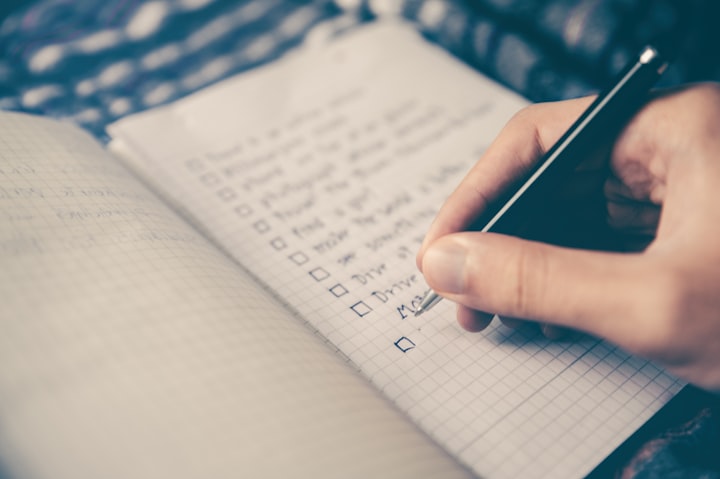The Importance of Making Lists
This is great advice that everyone should utilize to help stay organized!

The Importance of Making Lists
We all make lists, whether in electronic or paper form or, as I do, some combination of both. Surely most of our phones are filled with lists and our offices and homes with notepads full of checklists, as well as sticky notes covering our desks and computers. Lists are a vital tool for time management and for making sure everything you need to get done gets done. However, they are only an effective tool if they are properly utilized. In order to properly utilize lists, one should be aware of the various types of lists and the proper methods, tips, and tricks for using the tool efficiently.
**To Do Lists**
We are all really busy. In order to effectively complete all the things we have to do in a day, or memorialize and keep track of all the things that will have to wait for tomorrow, lists are an effective and vital tool. Taking time to write a list, or multiple lists, allows you to think about what needs to be done, when it needs to be done, and in what order. Also, by not having it in your head you aren’t burdened with the daunting task of trying to remember everything and keep everything straight in your head. By having a written or typed list to refer to, you can ensure things don’t get missed. Also, there is something satisfying about crossing an item off a list, something you cannot do with a mental list.
It is important to prioritize the items within the list in order to make sure you don’t complete an item the could’ve waited at the cost of not completing something that needed to be done today. Make sure to be cognizant of priorities and deadlines when you are deciding the order in which to tackle your list. Another tip is to break down tasks with many steps so that you have a list within a list and can attack the steps one at a time and check the parts off as you go.
**Delegated Tasks List**
If you need or want to get a task off your hands quickly, you should delegate it, assuming you are able to and the person you delegate it to can handle the task. In order to delegate tasks, you should first review your to-do lists and look for items that you can have someone else perform. You can delegate tasks in whole or in part. Depending on the circumstances, you may also pass the task off completely or retain supervisory control over the task and approval over the final product even though its completion has been largely passed off to another person. Even though you have delegated the task, you still need to ensure it gets done on time. There are many electronic methods to keep track of tasks and due dates and to monitor progress.
**Long-Term Goals List**
It is also important to keep lists of long-term goals and ideas that you want to complete or implement eventually but not immediately. These include completing your book or article, implementing a new business strategy, beginning a hobby, starting and growing a new area of your business, etc. By keeping a list like this, you don’t forget ideas or thoughts you may want later. This way when you are looking for a new project you can refer to this list instead of having to search your memory.
Good practice is to keep these lists separate from short-term lists. By keeping this list separate from your other to do lists, your lists remain organized and you are able to better prioritize your time. Also, because this makes your short-term to-do lists shorter, they appear less daunting and overwhelming and more doable than they would if you just kept one giant and overwhelming list. Also, since most of these items will linger on the list for a while, it would be discouraging to have only one big list where most of the items don’t get checked off. The sense of satisfaction and achievement from checking off an item from the list keeps you motivated, by only having one list you deprive yourself of that feeling.
**Lists of Things You Need to Get**
It is important to keep lists of things you are waiting for. By keeping this list, you can make sure things don’t fall through the cracks and follow-up as appropriate.
**Utilizing Cell Phone Alarms or Reminders**
Another set of tools that are complimentary to lists that can help you to remember to complete tasks, especially time sensitive tasks and errands that need to be done immediately, are alarms and reminders, particularly those on your cell phone. I frequently set alarms, in addition to making lists, in order to keep myself organized and to make sure I get done what I need to get done. Just remember to make sure they don’t go off at inappropriate or inopportune times, and remember that things often run long so be sure to budget plenty of extra time to ensure that you don’t have an alarm go off when it should not and that you don’t have to pull out a phone during a meeting or event to adjust alarms at the last minute before they go off.
**Keep Lists Secure and Consolidated**
It is good practice to back up digital lists, especially long-term and important lists, to prevent them from being lost and to allow you to access them remotely. Just be cognizant of any highly sensitive information and make sure it is properly secured. It is also a good idea to frequently consolidate and clean up your lists in order to keep them from becoming outdated, repetitive, and cluttered.





Comments
There are no comments for this story
Be the first to respond and start the conversation.